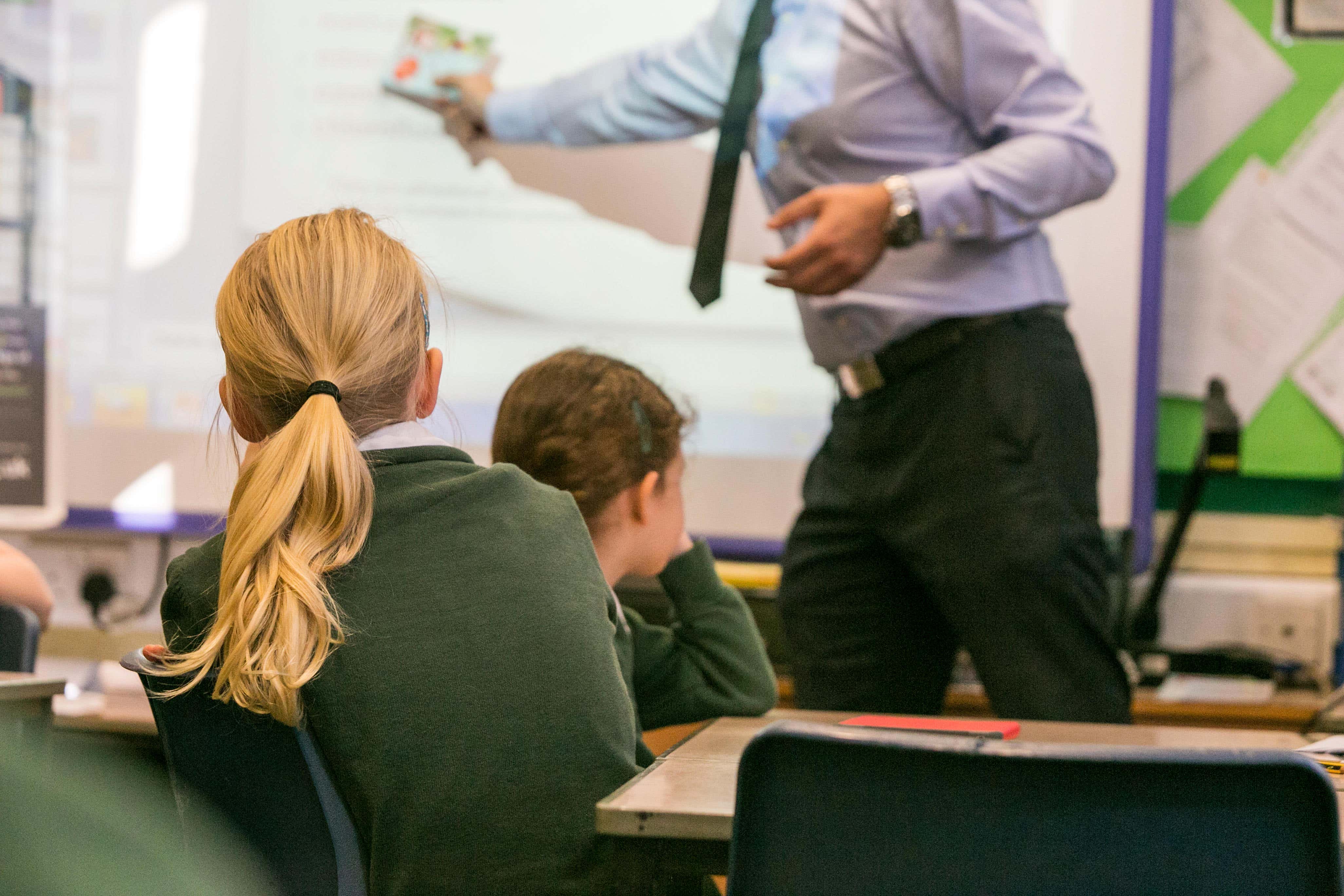Headteachers warn UK facing ‘dangerous’ teacher shortage as recruitment crisis deepens
Employment ‘worst it’s ever been’ as pay and conditions put graduates off profession

Your support helps us to tell the story
From reproductive rights to climate change to Big Tech, The Independent is on the ground when the story is developing. Whether it's investigating the financials of Elon Musk's pro-Trump PAC or producing our latest documentary, 'The A Word', which shines a light on the American women fighting for reproductive rights, we know how important it is to parse out the facts from the messaging.
At such a critical moment in US history, we need reporters on the ground. Your donation allows us to keep sending journalists to speak to both sides of the story.
The Independent is trusted by Americans across the entire political spectrum. And unlike many other quality news outlets, we choose not to lock Americans out of our reporting and analysis with paywalls. We believe quality journalism should be available to everyone, paid for by those who can afford it.
Your support makes all the difference.The UK is facing a “dangerous” teacher shortage as the recruitment crisis in the sector deepens, headteachers have told The Independent.
Figures this week show teacher vacancies in English schools have doubled in the past two years as falling pay and conditions make recruitment increasingly difficult.
Headteachers have now warned the situation has only deteriorated further since the statistics – which run until last November – were collected.
Daniel Leonard, headteacher at West Hatch High School in Essex, said it was getting worse “year after year”.
“It is a worrying state of affairs. There seems to be fewer people in the system, more people leaving, and more experienced staff getting out earlier than they might have previously. And it is dangerous, because it is going to impact massively on the kids.”
Steve Chalke, founder of Oasis Charitable Trust, which runs 52 schools across England, said the problem was not “new this summer” and was still “getting worse”.
And Benedick Ashmore-Short, chief executive of The Park Academies Trust (TPAT) said the recruitment situation – for both primary and secondary teachers – had been “significantly” worse this school year.

The latest government figures show 2,300 teacher vacancies – up from 1,098 just two years earlier. But the Times Educational Supplement showed almost 7,500 unfilled roles on Thursday, a week after the deadline for teachers to resign while giving their school time to find a replacement.
This means many roles will have to be filled by supply teachers while some subjects will be taught by non-subject specialists.
Recruitment is a particularly difficult problem for schools, as training teachers takes at least a year. The number of new entrants to Initial Teacher Training (ITT) has fallen from 40,377 in 2020-21, to just 28,991 last year, just 71 per cent of the government’s target, official figures show. Its target for maths, biology and chemistry were all missed.
For computing, just 30 per cent of the government’s target was achieved while in physics that figure was just 17 per cent. The government’s targets were exceeded in classics, drama, history and physical education.
Sam Freedman, a former adviser to Michael Gove as education secretary and senior fellow at the Institute for Government, told The Independent “recruitment is the worst it has ever been”.
“The figures are terrible this year,” he added. “When graduates are looking at new jobs, teaching is paying less relative to other jobs than it was and that inevitably is going to have an effect over time.”
Four teaching unions – the National Education Union, NASUWT, ASCL and NAHT – are piling pressure on the government to improve pay in the sector. The NEU and NASUWT have staged widespread industrial action while the two main headteacher organisations NAHT and ASCL are balloting members on possible strikes.
Mr Freedman pointed to pay as a reason for “terrible” recruitment figures, due to both people leaving the teaching profession prematurely, or not training to become one in the first place. He said the “big perk” of working from home – available in other jobs – had put people off.
Pay for teachers has been deteriorating relative to other jobs since 2010, according to the National Foundation for Educational Research (NFER).
Mr Leonard, who is also chairperson of the Association of Secondary Headteachers in Essex, said schools are facing a “pig’s ear”.
He described schools having to consider increasing class sizes and cutting subjects – such as foreign languages, design and technology and computing – while pupils are taught by non-specialists in key areas such as maths and science.
“If you can’t recruit, what do you do? Do you put all the students in a hall and teach in groups of 60 or 70?” he said.
Dr Patrick Roach, from the NASUWT, described the scale of the crisis as “unprecedented” as he blamed rates of pay and soaring levels of workload, while Dr Mary Bousted, from the NEU, said annual teacher training targets are “routinely missed, even when those targets are reduced”.
Mr Chalke, from Oasis, accused the government of “shortsightedness”, adding: “The pay and conditions are a real issue but training is also a problem.”
He said teachers are well prepared to deliver lessons, but many are driven out of the job by a lack of training around how to deal with children – especially amid a growing mental health crisis among pupils.
Mr Ashmore-Short, chief executive of TPAT, said incentives were increasingly used to attract teachers for both primaries and secondary schools: “Teachers offered jobs are now routinely requesting golden handshakes, relocation packages and higher starting salaries.
“We are also seeing teachers accept jobs only to renege if a better offer comes along – this has never traditionally been the case in the profession. This competition will drive up average salaries, particularly in shortage subjects, and lead to systemic pay inequity.”
And Turner Schools chief executive Seamus Murphy said: “We are seeing primary and secondary schools struggling to recruit maths, science, and English teachers.
“We always review class sizes across our schools, and as a result of recruitment pressures, we have increased class numbers in one of our primaries to above 30 pupils for the first time.”
Shadow education secretary Bridget Phillipson said the discontent among teachers is “much wider than simply pay”.
“There’s a sense in which teachers feel that support in school has been stripped away from them,” she said. “The recruitment and retention crisis is about support staff as well as about teachers, and the challenges with which they have to deal are being made worse and worse by the wider problems with our economy and society outside the school gate.”
A spokesperson for the Department for Education said: “Since 2010 we’ve increased the number teachers working in state-funded schools by 24,000, now totalling more than 465,000.
“Almost 9 in 10 teachers who qualified in 2020 were still teaching one year after qualification, and just over two thirds of teachers who started teaching five years ago are still teaching.
“We want to continue bringing great people into teaching and have bursaries worth up to £27,000 tax-free and scholarships worth up to £29,000 tax-free, to attract talented trainees in subjects such as mathematics, physics, chemistry and computing.”






Join our commenting forum
Join thought-provoking conversations, follow other Independent readers and see their replies
Comments